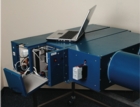Ability fan-coil units use software to set design performance

A version of its EC Matrix fan-coil unit that does not require commissioning has been introduced by Ability Projects.
The need for commissioning is overcome by loading information and air volumes per duct run and design flow rates for heating and cooling water into the terminal controller of Matrix II fan-coil units strategy during manufacture at Ability’s factory. When units have been installed on site, they sense their surroundings and adjust automatically to deliver and maintain the factory-preset air volume and water flows. After a fit-out, any value in the control strategy can be changed and transmitted to a single fan-coil unit or a group. It is also possible to reset the entire building system in just a few seconds through the software alone.
Air flows from Matrix FCUs were adjusted by controlling the speed of each fan, which serve just one discharge grille. With Matrix II, the required airflow is entered directly into the software.
Similarly, the required water flow (both heating and cooling) is entered into the software and controlled by a 2-port pressure-independent valve that modulates between closed and fully open at the design flow rate. Water flow can be adjusted through the software or the BMS without needing access to the FCU itself.
The software enables different settings for occupied and unoccupied spaces to save energy.







